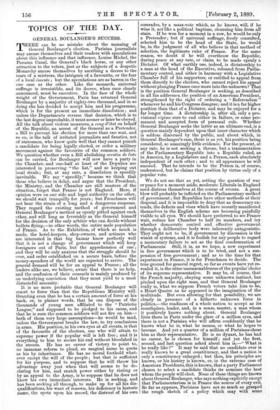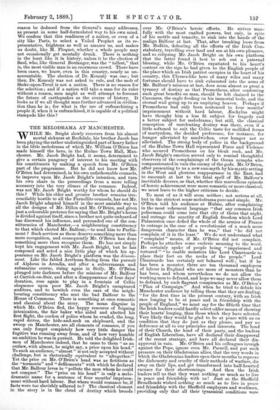TOPICS OF THE DAY.
GENERAL BOULANGER'S SUCCESS.
THERE can be no mistake about the meaning of General Boulanger's election. Parisian journalists may amuse themselves and their readers with speculations about this influence and that influence, Louise Michel, the Panama Canal, the General's black horse, or any other attraction to the voters, just as the subjects of a despotic Monarchy amuse themselves by ascribing a decree to the tears of a mistress, the intrigues of a favourite, or the fear of a local imeute ; but the speculations are as barren in the one case as the other. Like the monarch, universal suffrage is irresistible, and its decree, when once clearly announced, must be executive. In the face of the whole weight of the Government, Paris has returned General Boulanger by a majority of eighty-two thousand, and in so doing she has decided to accept him and his programme, which is for the present an immediate dissolution ; and unless the Departments reverse that decision, which is to the last degree improbable, it must sooner or later be obeyed. All the talk about violent measures, a coup d'état on behalf of the Republic, an arrest of the General as a Pretender, a Bill to prevent his election for more than one seat, and so on, is the talk of irritated journalists and fanatics, not of statesmen, who know quite well that they cannot punish a candidate for being legally elected, or order a military movement against the favourite of the common soldiers. We question whether even a Bill abolishing scrutin de lists can be carried, for Boulanger will now have a party in the Chamber, and one-half at least of the Deputies are interested in preserving "the list," and so keeping out local rivals ; but, at any rate, a dissolution is speedily inevitable. We say "speedily," because we think that those who believe in delay, and argue that the President, the Ministry, and the Chamber are still masters of the situation, forget that France is not England. Here, if opinion were on one side and legal authority on the other, we should wait tranquilly for years ; but Frenchmen will not bear the strain of a long and a dangerous suspense. They regard the existing method of government and General Boulanger's method as openly pitted against each other, and will long as feverishly as the General himself for the decision of the only arbiter who can decide without bullets flying,—in other words, the entire male population of France. As to the Exhibition, of which so much is made, the hotel-keepers, shop-owners, and artisans who are interested in that big bazaar know perfectly well that it is not a change of government which will keep foreigners out of Paris, but the apprehension of one ; and they will be only anxious that the struggle should be over, and order established on a secure basis, before the money-spenders of the world are expected to arrive. The general demand will be for an appeal to France ; all the leaders alike are, we believe, aware that there is no help, and the confusion of their counsels is mainly produced by an underlying conviction that they must yield to a most distasteful necessity. It is no more probable that General Boulanger will resort to force than that the Republican Ministry will. Granting even that he has a certain amount of force at his back, or, in plainer words, that he can dispose of the thousands of young men affiliated to the "Patriotic League," and supposed to be pledged to his cause, and that he is sure the common soldiers will not fire on him— both of them very large assumptions—he would be mad, unless the Government breaks the law, to try conclusions in arms. His position, in his own eyes at all events, is that of the favourite of the electors, one who will attain to supreme power if the popular will is left free ; and it is everything to him to secure his end without bloodshed in the streets. He has no career of victory to point to, no immense reform to plead, no magical name to quote as his by inheritance. He has no moral foothold what- ever except the will of the people ; but that is sufficient for his purpose, and to suppose that he will throw his advantage away just when that will seems to be de- claring for him, and snatch power either by rioting or by an appeal to the Army, is to suppose that he does not know his own immediate interests. He is seeking, and has been seeking all through, to make up for all his dis- qualifications, his want of renown, his deficiency in historic name, the spots upon his record, the distrust of his own comrades, by a mass-vote which, as he knows, will, if he wins it, act like a political baptism, cleansing him from all stain. If he won for a moment in a row, he would be only a Pretender; • but if universal suffrage, freely consulted, selected him to be the head of the State, he would be, in the judgment of all who believe in that method of selection, the legitimate ruler of France. For the same reason, we doubt if he will overthrow the Republic, during peace at any rate, or claim to be made openly a Dictator. Of what earthly use, indeed, is dictatorship to a man at the head of the Executive, released from Parlia- mentary control, and either in harmony with a Legislative Chamber full of his supporters, or entitled to appeal from them directly to the electors, who cannot reject his appeal without plunging France once more into the unknown? That is the position General Boulanger is seeking, as described in all his addresses, the position of an American President, strengthened by the right of ordering a " Referendum " whenever he and his Congress disagree; and it is a far higher position than that of a Dictator, and may be enjoyed for a far longer time. A dictatorship is, after all, only a pro- visional regime sure to end either in failure, or some per- manent and accepted form of personal rule. Whether General Boulanger seeks the latter as an ultimate end, is a question mainly dependent upon that inner character which is seldom discerned by the public, and about which, in General Boulanger's case, there is as yet, his position being considered, so amazingly little evidence. For the present, at any rate, he is not seeking a throne, but a transmutation of the Parliamentary Republic into a Republic ruled, as in America, by a Legislature and a Person, each absolutely independent of each other ; and to all appearance he will succeed. That he intends to be the Person is, of course,, understood, but he claims that position by virtue only of a popular vote.
We do not see that as yet, setting the question of war or peace for a moment aside, moderate Liberals in England need distress themselves at the course of events. A great blow will probably be inflicted on the Parliamentary method of government ; but Republics have other methods at their disposal, and. it is impossible to deny that as democracy ex- tends, the defects and vices which have recently manifested themselves in the English scheme are becoming painfully visible to all eyes. We should have preferred to see France wait, reduce her Chamber to half its numbers, and try whether democratic control and effective government through a deliberative body were inherently antagonistic. They ought not to be, if government by discussion is the wisest of systems, and it is foolish for any people to regard a momentary failure to act as the final condemnation of Parliaments. Still, it is, as we hope, a new experiment in free government which is to be tried, and not a sus- pension of free government ; and as to the time for that experiment in France, it is for Frenchmen to decide. The true ground for general regret, so far as events have yet re- vealed it, is the utter unreasonableness of the popular choice of its supreme representative. It may be, of course, that the French majority, obeying some unknown instinct, has pitched upon the right man, and. that General Boulanger really is, what we suppose French voters take him to be, a Henri Quatre as he appeared in the imagination of the multitude. But even allowing for that possibility, we are dearly in presence of a hitherto unknown force in politics,—the readiness of a whole nation to accept as its mouthpiece, leader, and, in a sense, master, a man whom it positively knows nothing about. General Boulanger lives there in Paris under the glare of a million eyes, and there is not a Parisian who will affirm confidently that he knows what he is, what he means, or what he hopes to become. And yet a quarter of a million of Parisians chose him as their representative. He is no dynast, he has had no career, he is chosen for himself ; and yet the first, second, and last question asked about him is,—" What is he really like ?" It may be said that no candidate ever is really known to a great constituency, and that a nation is only a constituency enlarged ; but then, his principles are known, or his history is known, or, in the extreme case of American Presidents, this is known, that a party Parliament chosen to select a candidate thinks its nominee the best whom the people will elect. None of these things are known about General Boulanger, who says nothing explicitly except that Parliamentarism is in France the source of every evil. So far as appears, Parisians have not so much as grasped the rough sketch of a policy which may with some reason be deduced from the General's many addresses, as present in some half-formulated way to his own mind. We confess that this readiness of a nation, or even of a city like Paris, to select a Veiled Prophet as its re- presentative, frightens as well as amazes us, and makes us doubt, like M. Floquet, whether a whole people may not occasionally get mentally drunk. There is nothing in the least like it in history, unless it be the election of Saul, who, like General Boulanger, was the " tallest," that is, the most visible man in an enormous crowd. There have been cases, we know, even in this country, nearly as un- accountable. The election of Dr. Kenealy was one ; but then, Dr. Kenealy was not asked to rule, and the mob of Stoke-upon-Trent is not a nation. There is no reason for the selection ; and if a nation will take a man for its ruler without a reason, men might as well attempt to forecast the future of earthquakes as the course of history. It looks as if we all thought man further advanced in civilisa- tion than he is ; for what is the use of enfranchising a people if, when it is enfranchised, it is capable of a political stampede like this ?



































 Previous page
Previous page